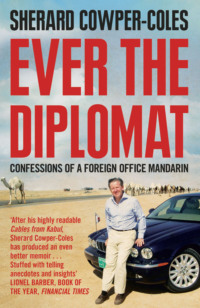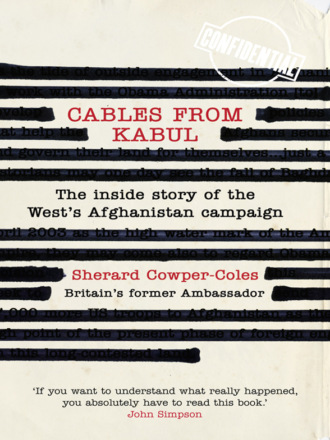
Полная версия
Cables from Kabul: The Inside Story of the West’s Afghanistan Campaign

Sherard Cowper-Coles
Cables from Kabul

Dedication
In memory of
Richard Holbrooke,
who gave his life for peace
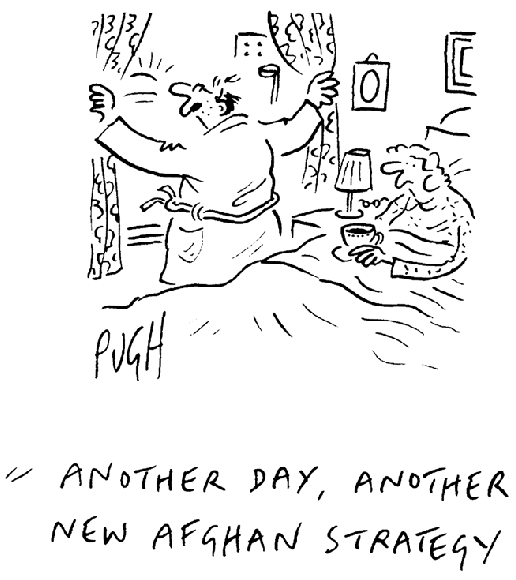
Contents
Title Page
Dedication
List of Illustrations
Map of Afghanistan
Map of Kabul
Tribute to the Fallen
Preface
Part I: Beginnings
1 An Offer I Couldn’t Refuse
2 First Impressions
3 Helmandshire
4 ‘A Marathon Rather Than A Sprint’
5 Breather Break
Part II: Hope Over Experience
6 A King’s Funeral
7 The Spreading Virus
8 The Great Game – Round Four
9 Hooked on Drugs
10 Coping in Kabul
11 Highland Fling: Karzai in Scotland
12 Mr Brown Comes to Town
Part III: Against An Ebbing Tide
13 Reversal of Fortune
14 ‘We Are Winning – Only It Doesn’t Feel Like It’
15 The Karzai Conundrum
16 Cracking On in Helmand
17 Afghan Attitudes
18 Waiting for Obama
Part IV: Tactics Without Strategy: One Last Heave
19 Biden and Beyond
20 Au Revoir Afghanistan
21 Richard Holbrooke’s Flying Circus
22 Where’s Dick?
Part V: Recessional
23 Embassy Encore
24 Untying the Knot
25 Three Lessons Learned
26 Back to the Future
Photographic Insert
Endpapers
Acknowledgements
Abbreviations
Searchable Terms
About the Author
Copyright
About the Publisher
List of Illustrations
‘Another day, another new Afghan strategy’ cartoon by Pugh © Jonathan Pugh/The Times/NI Syndication
‘Afghanistan – “It’s a marathon rather than a sprint”’ cartoon by JAS © JAS/The Telegraph
The British Residence in Kabul in 1968. Photograph by a member of the British Embassy staff
S C-C with the Grenadier Guards in Helmand. Photograph by 1st Battalion, Grenadier Guards
S C-C and Lieutenant Colonel Carew Hatherley. Photograph by 1st Battalion, Grenadier Guards
All other photographs are from the author’s private collection and were taken either by him or by friends, colleagues or family members.
Map of Afghanistan
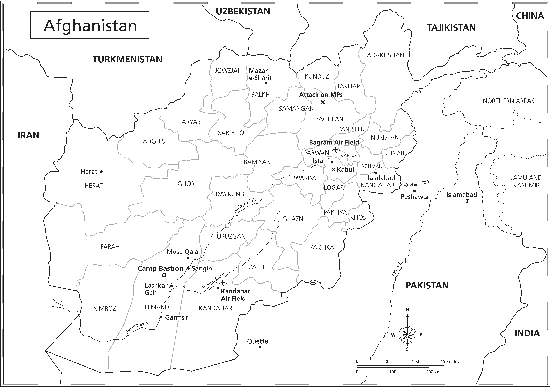
Map of Kabul
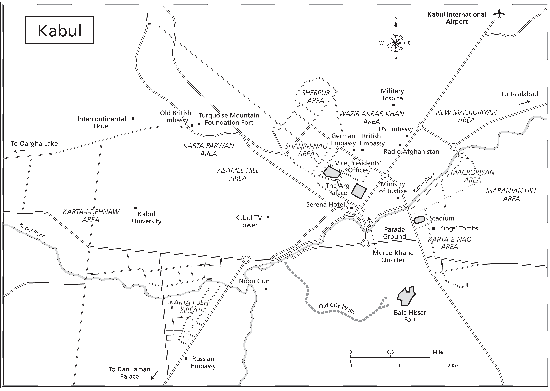
Tribute to the Fallen
Text of Diplomatic Telegram of 24 February 2008 from HM Ambassador Kabul to the Foreign Secretary in London:
1 On 23 February, thanks to a fortunate delay in obtaining a helicopter flight from Camp Bastion to Lashkar Gah, I was able to join Lt Gen Jonathon Riley (Deputy Commanding General, ISAF) and several hundred other British and allied troops at the Service of Repatriation for Corporal Damian Stephen Lawrence of the 2nd Battalion, The Yorkshire Regiment (The Green Howards). As this was the first British ‘ramp ceremony’ I had attended (I had once been to a much more elaborate Canadian ceremony at Kandahar), I cannot resist recording what I saw and heard, and felt.
2 Corporal Lawrence had died on 17 February, on operations with the Afghan National Army as part of an Operational Mentoring and Liaison Team. This difficult and dangerous work, performed with quiet distinction by the 2nd Yorks, is the keystone of our strategy in Afghanistan.
3 We gathered an hour before sunset. The troops – scores of Corporal Lawrence’s regimental comrades, men and women of all ranks and regiments of the British Army, 40 Commando Royal Marines, the Royal Navy, the Royal Guards Hussars of the Danish Army, Estonians and Americans, were formed into a great three-sided square, facing west towards the new runway at Bastion, and the empty spaces stretching to Iran beyond.
4 In the centre of the square stood the Padre, wearing battledress beneath his bands, and the ramrod column of the Regimental Sergeant Major, Mr Hind. Before us the sun was setting across the great southern desert, casting long shadows, illuminating the whole ceremony in shades of dusty gold. There was silence. The Chinooks and Sea Kings, Apaches and Lynxes, which usually buzz in and out of Bastion every few minutes from the helicopter lines behind us, had ceased flying, out of respect for the fallen.
5 And then, out of the sky to the north, appeared a single Hercules of the Royal Air Force. With a great roar it landed, perfectly, on the runway in front of us, and taxied out of sight, and sound.
6 Corporal Lawrence’s Commanding Officer, Lt Col Simon Downey, marched stiffly out into the middle of the parade ground. The RSM called us to attention. A bearer party, found by the Green Howards, brought Corporal Lawrence’s coffin, bound in the Union flag, out on to the centre of the square.
7 The service began, in the best traditions of lapidary Army Anglicanism. Plenty of dignity, not too much religion. The words of comfort for those who mourn from St Matthew; a few prayers, with responses; St John 14 (‘In my Father’s house there are many rooms’); Binyon’s lines (‘At the going down of the sun, And in the morning, We will remember them’), barked out, improbably, by the RSM; a lone bugler played Last Post, and Reveille; a well-judged eulogy, full of humanity and humour, by Colonel Downey; a deeply moving message of maternal pride, and affection for the regiment, from Corporal Lawrence’s Mum, on the North Yorkshire coast; and finally the Collect of the Yorkshire Regiment (‘Grant to the Yorkshire Regiment in its battalions and ranks, the strength that fears … no desperate endeavours and no foe bodily and spiritual; but advances in thy righteousness through all the rough places under the Captain of our salvation …’). The Lord’s Prayer, said together, the Blessing, and the Service itself was over.
8 By now the evening wind was up, and it was growing cold. And out of the silence we heard again the gradually growing growling of the C-130’s engines, as, with impeccable timing, it taxied back into sight. Then, in an extraordinary manoeuvre, it reversed thrust, and backed into the open side of the square, to take delivery of its sad cargo.
9 With the engines still turning, a loadmaster jumped down from the rear ramp, and stood to attention. A female RAF Corporal marched out, saluted smartly, and handed him the airwaybill. The Commanding Officer, and Mr Hind, formed up alongside the ramp. The bearer party shouldered the coffin, and, accompanied by the Padre, marched with perfect precision up into the hold of the Hercules. Colonel Downey mounted the ramp. Out of sight, he said his farewell to his fallen comrade. In short order, the bearers and accompanying party dismounted, the ramp closed, the Hercules taxied out, and took off. We stood in silence, listening to the fading murmur of its engines.
10 And then, in one of the most striking moments of the whole ceremony, from out of the setting sun came the roar of the Hercules, flying in fast and low. As the aircraft passed over, and started to climb, the starboard wing dipped, in impossibly eloquent tribute from the Royal Air Force to Corporal Lawrence and all those who had fallen here. As we watched, the aeroplane climbed in a great wheeling turn, up into a still blue north-eastern sky, taking Corporal Lawrence on back home, via Kandahar and Brize Norton, to North Yorkshire.
11 The RSM dismissed the parade. The obsequies were over. It was now dusk. A great crush of men and vehicles pressed back into Britannia Lines, and the work of this war.
COWPER-COLES
Preface
Ah, love, let us be true
To one another! for the world, which seems
To lie before us like a land of dreams,
So various, so beautiful, so new,
Hath really neither joy, nor love, nor light,
Nor certitude, nor peace, nor help for pain;
And we are here as on a darkling plain
Swept with confused alarms of struggle and flight,
Where ignorant armies clash by night.
Matthew Arnold, ‘Dover Beach’
Some 2,000 years ago, a Greek recorded a conflict which had convulsed the Hellenic lands for more than three decades. The writer wanted his work to be a possession for all time. He hoped that men would use it as a guide to avoid the mistakes that had precipitated the events through which he had lived. But he noted that human nature never really changed. Men probably would therefore ignore the lessons of his history, and repeat the errors he had reported. Nevertheless, he thought it worth setting down his account anyway, just in case expectation might for once be confounded by hope fulfilled.
The conflict in Afghanistan is no Peloponnesian War, although it has lasted even longer. And I am certainly no Thucydides. But for three and a half years, from May 2007, I experienced at first hand a struggle that was by the spring of 2011 swallowing each year some $125 billion of US taxpayers’ money and getting on for £6 billion a year from the British Exchequer. This was a real war that had by then taken the lives of more than 2,000 coalition soldiers and of some 350 British servicemen and women, as well as those of tens of thousands of Afghans in and out of uniform. More than 10,000 American soldiers had been wounded in Afghanistan.
As British ambassador in Kabul from 2007 to 2009, and then as the Foreign Secretary’s special representative for Afghanistan and Pakistan from February 2009 until September 2010, I saw politicians, generals, diplomats and officials struggling with successive strategies which never seemed to deliver what we wanted, and with military tactics which – we all knew – could not, without a credible political strategy, resolve Afghanistan’s underlying problems.
In London, in the English shires, and in the border areas of Scotland and Wales which supply so many of our fighting men and women, as well as in Washington and the fifty states beyond, there was an uneasy sense that this war was misconceived. Many people shared the sentiment attributed to one of the wisest of British prime ministers, Harold Macmillan, that the first rule of politics is ‘Don’t invade Afghanistan.’ For Britons especially, the unhappy history of earlier military expeditions into Afghanistan weighed heavily. Most press commentators were sceptical.
And yet we carried on, as part of a great US-led coalition, with a mainly military, and hugely expensive, campaign to stabilise a faraway country of which we truly knew little. We stuck at it because Britain couldn’t and wouldn’t let down its coalition partners, especially the Americans. We kept going because we wanted to support our troops. We stuck at it because we wanted to believe our generals. Each year they assured us that, at last, they had the strategy and the resources they needed to do the job. This year at last, they said every year, we were going to turn the corner. The Americans had a new plan, a new general, a fresh surge. ‘Astronomical progress’ was being made. The momentum of the insurgency was being reversed. There was reason for cautious optimism. Finally, it was safe to stroll (in body armour) in the bazaar of some fly-blown village in the Helmand Valley. Nobody, especially not politicians seeking votes in Middle England, wanted to be accused of not backing our boys.
But Middle England took a more nuanced view. The same people who were so fiercely loyal to the regiments woven into the fabric of British society had doubts about why those regiments were in Afghanistan at all, and about what lasting good they were doing there. Middle England, and Scotland and Wales and Ireland as well, had folk memories of what had happened to British battalions which had ventured too far, or stayed too long, west of the Indus. Among some of the armed forces’ most loyal civilian supporters there was a consciousness about Afghanistan that combined Carry On up the Khyber and Flashman with ancestral memories of forebears who had fought and died on India’s North West Frontier.
Most other books on the present conflict in Afghanistan have fallen into one of two categories. On the one hand, there have been dozens of breathlessly whizz-bang accounts of the fighting by journalists embedded with the troops. Each of those books is a potent and richly deserved tribute to the sacrifice and courage of our fighting men and women. But, precisely because such war stories focus so closely on combat, they sometimes miss the broader perspective of the war. Moreover, when a journalist has put his life, literally, in the hands of the men and women about whom he writes, it seems like bad manners or worse to ask what wider purpose is served by one’s hosts’ superhuman sacrifice. On the other hand, there have been some outstanding semi-academic descriptions of the conflict and of the lands, not just Afghanistan, in which it is taking place. But, by their nature, neither set of books has offered the picture of the strategic direction of this war which I hope here to provide. Thus this book tries, through the prism of my small part in the enterprise, to illuminate some of the political and diplomatic aspects of Britain’s and America’s mainly military engagement in Afghanistan.
I try to address some fundamental questions about the nature of the West’s Afghanistan project. I explain how the doubts I had, even before I had left London, about the strategy we were supposed to be pursuing were confirmed by experience on the ground. I describe my growing admiration for the extraordinary courage and professionalism of our fighting men and women in Helmand. But I also explain how I came gradually to understand that the problems we faced went far beyond ‘merely’ countering the Taliban insurgency in the south and east. I tell how I came to see that the Taliban had never been defeated in 2001–2; that the Bonn settlement that had followed had been a victors’ peace, from which the vanquished had been excluded; and that the constitution resulting from that settlement could last only as long as the West was prepared to stay in Afghanistan to prop up the present disposition.
More specifically, the book pays tribute to the tactical success our soldiers are undoubtedly having. But it also illustrates the deficiencies of a strategy focused on pacifying and garrisoning with Western troops selected areas of the country where the insurgency is strongest, in order to hand those areas over to the civil and military agencies of a half-formed central Afghan state. It suggests that, even if our military achieve local, tactical and temporary success in Helmand or Kandahar, that will be far from enough to achieve within three years our wider strategic goal of stabilising Afghanistan to the point where the Afghan authorities can secure and govern the country with only money and advice from outside. It points out that the ‘Government’ to which we plan gradually to transfer security responsibility, province by province, is far from being either able or willing to secure, let alone govern, such a legacy. And it shows how my then boss, the Foreign Secretary, David Miliband, and I became convinced that the only sensible strategic approach had to be a political one, drawing in all the internal and regional parties to a conflict with roots far deeper than the Western intervention of October 2001.
Finally, the book sets out my conviction that the Afghanistan project can be brought to a successful conclusion, but only once America is prepared to talk direct to its enemies, and then to devote unprecedented political and diplomatic resources to leading an international effort to devise and deliver an internal and regional political process. Whether the American Republic is confident enough to do that remains an open question. There must be doubts too about whether America will be willing properly to finish the job, now that the demon who first drew us into Afghanistan – Osama bin Laden – has finally been exorcised. And it may well be that the moment for negotiating a well-ordered exit from Afghanistan for NATO forces has passed, as the political pressure mounts for having our troops leave the battlefield by the end of 2014 more or less regardless of conditions on the ground.
None of this is to say that military success won’t be achieved or proclaimed. Nor that a political framework for withdrawal won’t in the end be negotiated, in something of a rush, to meet Western not Eastern timelines. But, without the West taking the initiative, it risks being suboptimal and, in the great sweep of Afghan history, short lived. In time historians may point to the parallels with earlier imperial scuttles, with the baneful consequences of which the world is still living.
Inevitably, the book is written from the perspective of a diplomat, based in Kabul, and then in London, over three years from 2007. It does not cover the tragic diversion of attention and then resources from Afghanistan to Iraq from 2002, or the British Government’s fateful decision to take on Helmand in 2006. It is not about the ground war in Helmand. It focuses on the means diplomats and their political bosses use to understand and influence. It describes the work of an embassy and an envoy, in circumstances that were highly unusual in many respects, but typical in many others. What made the Embassy in Kabul different was that we were operating in a war zone, alongside and in support of a massive military effort. But the work of reporting and analysis, of entertaining and influencing contacts, of international consultation and co-ordination, resembled normal diplomacy in other capitals around the world. In Kabul, however, it mattered more than it did in most places.
In putting this story into print, I have had no access to the extensive records I lodged in London of almost every significant official interaction I had over more than three years. Instead, I have relied on memory, and on four daily lines of scribble in a rough and ready diary, telling me where I was, but not what I was really doing or thinking. The book does not therefore pretend to be a full or authoritative account of what happened: rather it is a reflection of my evolving understanding of what we were doing in and to Afghanistan, and of what Afghanistan was doing to us.
As a former official, I asked myself whether publishing an account of my experiences so soon after I had left the public service was consistent with my obligations to my former employer. But Diplomatic Service Regulations state that ‘The FCO welcomes debate on foreign policy … The FCO recognises that there is a public interest in allowing former officials to write accounts of their time in government. These contributions can help public understanding and debate … there is no ban on former members of the Diplomatic Service writing their memoirs … but obligations of confidentiality remain …’
What is at stake in Afghanistan is not trivial. It is not an issue of ideology. Nor is it a question of political allegiance. It goes deeper than diplomatic nicety, and beyond the pride of individuals or institutions. Few aspects of this story are truly confidential. It is a war in which the West has invested vast quantities of blood and treasure – and reputation. After nearly a decade of conflict, getting it as right as is now possible is a major national interest, for us, for America, for our allies and, above all, for millions of wretched Afghans who have suffered too much and for too long.
So if, in its small way, this book helps us correct some of the mistakes, of both strategy and tactics, that we may be making, it may do some good.
PART I
BEGINNINGS
If the task is arduous, the mission is noble.
President de Gaulle’s sole instruction to the new Government Delegate in Algiers, November 1960
Chapter 1
An Offer I Couldn’t Refuse
Monday 30 October 2006 – the Ambassador’s Office, British Embassy, Riyadh, Saudi Arabia: I was sitting sleepily at my desk after lunch, catching up on reading. I had returned only the night before from a family holiday in Egypt. My secretary came in: could I have an urgent word on the secure phone with a senior official in London?
Of course I could, I said, wondering with the usual mixture of excitement and dread what this could be about. The silky tones of the senior official soon cut to the chase. ‘Ministers’ had decided to upgrade Britain’s civilian effort in Afghanistan, to try to keep pace with the huge increase in military resources being pumped into Helmand. They thought that I was the right person to take charge of what would become one of the largest and most unusual British diplomatic missions in the world. There had been pressure from the British military for a ‘heavy hitter’ to be sent as ambassador. I would be working on the standard terms of six weeks on, two weeks off. I would see more of my family than if I remained in Saudi Arabia to complete my tour there. I would go to Kabul for a year or so to start with, but, naturally, it was hoped I would stay for longer. The whole thing was still very secret (hence the secure line), not least because the incumbent in Kabul had not been told. Was I interested? Like the fool I am when flattered, I said of course I was interested. I would need to talk this over with my wife, but I knew this was just the sort of challenge I relished. The senior official sounded relieved. London would be back in touch in due course. In the meantime, not a word to anyone – apart of course from my immediate family.
Weeks, and then months, passed without my hearing anything more. I wondered if I had been dreaming, or if the senior official had changed his mind – as he was prone to do on personnel matters. I managed to persuade a worried family that this early move made professional sense. I had already completed three of the four years I had been due to spend in Saudi Arabia. Privately, I thought, without being too pompous, that much of my career had helped prepare me for this. I had been opposed to the invasion of Iraq. But I had believed that we had had little alternative to joining the Americans in toppling the Taliban from power in Kabul in October 2001, when in the wake of 9/11 they had refused to hand over Osama bin Laden and his lieutenants. Like President Obama and many others, I had an instinctive sense that Afghanistan was the good campaign (in 2006 it was not yet evident that it was a full-scale war), in which much had been achieved for the long-suffering people of Afghanistan.
Moreover, I knew the job would involve working with the military. Ever since as a small boy I had manoeuvred my battalions of Britain’s toy soldiers around the sandpit at home, I had been interested in matters military. I enjoyed dealing with soldiers. I knew their jargon, and admired their can-do style. I was in awe of their confidence and efficiency. And, at least since I had followed the great counter-insurgency campaigns of the 1950s and 1960s (Malaya, Algeria, Aden, Northern Ireland, Vietnam above all) through the pages of the Illustrated London News my grandmother had sent me each week, I had been interested in strategy and tactics. I had read widely about counter-insurgency. At Oxford, my best subject had been Roman military history. My favourite historians were those great chroniclers of ancient wars, Tacitus and Thucydides.
At least as important, my years in different parts of Arabia, and my fluent but flawed Arabic, had given me a sense of what mattered in the Muslim world and made it move. Working in a part of the Islamic world where people prayed in Arabic, but spoke or thought in other languages, had enormous attractions – especially one with as much history and geography as Afghanistan and the North West Frontier of Imperial India.



